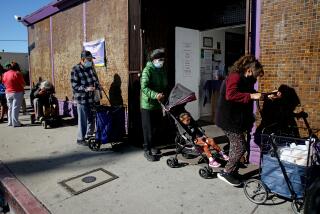The Next Step Toward Home : Tanya Tull helps homeless go beyond temporary shelter and into residential neighborhoods.
- Share via
In the mid-1980s, the initial response of communities to homelessness, particularly the big cities who saw it first, was to create emergency shelter. Everyone thought it was a temporary situation. But the numbers of homeless families kept increasing. I saw the same families get recycled through every program in town. With emergency shelters, you are just giving someone a place to stay. But unless they have someone help them get into an apartment, and they can afford it, what kind of lasting help are you really giving them?
In the mid- to late-’80s people working with homeless families decided we needed to do transitional housing, to help people learn how to live independently. The problem there is that you’re lumping together all people who lose their housing. That’s not effective.
Think of how a 30-year-old mother of three feels. She used to work until she had babies, then her husband dumped her, and now because she lacks housing she is forced to take parenting and housekeeping classes. It’s demeaning.
I decided in ’87 we were doing something wrong. We needed to fill in the gap. Many of us working with the homeless have backtracked and turned around. If someone is on the street and needs a place to stay, getting shelter is only the first step. We needed to get families from emergency shelters to agencies through which they would be relocated to permanent housing.
Once you are in a residential neighborhood, that’s where you create self-esteem, that’s where you learn real skills, when you have a real grocery store and a real kitchen to cook in. It helps break the cycle of hopelessness and fear.
We help families overcome the barriers to housing: negotiating leases, overcoming bad credit histories. We offer landlords a case agent for each family that will help them solve problems that might interfere with paying their rent.
We’ve moved over 600 families since we started in April, 1989. A hundred of them were interviewed recently and 94% were still in the same housing.
The thing that’s important is that those families are no different than the families in their neighborhoods. We should be moving toward neighborhood support agencies for everyone who is about to lose their housing. They would offer crisis intervention for job loss, sudden single parenthood, family violence. They could offer survival-skills training like housekeeping, how to manage on a low income, how to shop economically, cook more nutritionally, child-care assistance so people can work. Also, welfare and legal advocacy. Many times people become homeless because they are denied benefits or wages.
We have a whole generation of young children who are going to grow up dysfunctional. In school, the kids are embarrassed and may not do well. Parents can take out their frustrations on the kids. Kids as young as 7 or 8 take on a parenting role for parents who have fallen apart. They need counseling and support to put it back together.
More to Read
Sign up for Essential California
The most important California stories and recommendations in your inbox every morning.
You may occasionally receive promotional content from the Los Angeles Times.






